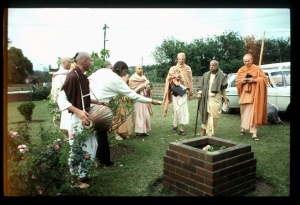CC Madhya 19.214

A.C. Bhaktivedanta Swami Prabhupada
TEXT 214
- kṛṣṇa vinā tṛṣṇā-tyāga—tāra kārya māni
- ataeva ‘śānta’ kṛṣṇa-bhakta eka jāni
SYNONYMS
kṛṣṇa vinā—without Kṛṣṇa; tṛṣṇā-tyāga—giving up all desires; tāra—of śānta-rasa; kārya—the business; māni—I accept; ataeva—therefore; śānta—the position of equilibrium; kṛṣṇa-bhakta—a devotee of Kṛṣṇa; eka—only; jāni—I know.
TRANSLATION
“Giving up all desires not connected with Kṛṣṇa is the business of one who is in śānta-rasa. Only a devotee of Kṛṣṇa can be situated on that platform. He is thus called a śānta-rasa-bhakta.
PURPORT
In this position, one is freed from all material enjoyment. When one is not agitated or disturbed, he can immediately realize his relationship with Kṛṣṇa. A śānta-rasa devotee is therefore always fixed in realization. This instruction was given by the Lord Himself to Uddhava. The beginning of pure devotional service is called anyābhilāṣitā-śūnya. When one is situated on the platform of neutrality, he is freed from the material platform and fully situated in spiritual life. The word dama, used in verse 213, means indriya-saṁyama—curbing one’s senses. The word dama can also mean curbing one’s enemies. A king has to take steps to curb the criminal activities of his citizens. Great rājarṣis, devotee kings, used to control undesirable elements in their states, and this also may be called dama. However, dama here refers to the conditioned soul who must control his senses. Real dama means controlling the undesirable activities of the senses.